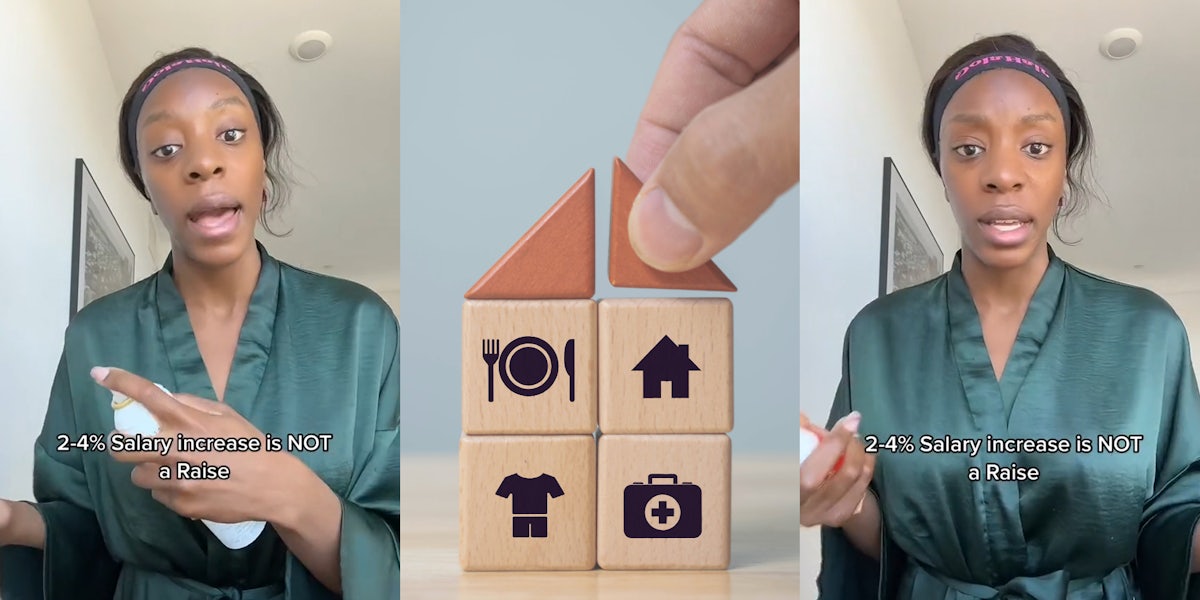A user on TikTok has gone viral and sparked discussion after sharing a video about wage increases.
In a clip with over 911,000 views as of Saturday, TikTok user Kyyah (@kyyahabdul) lays out her argument as to why minor increases to wages may not be as good as they initially seem.
“A 2 to 4% salary increase is not a raise,” she says. “That’s what we call a ‘cost-of-living adjustment.’”
@kyyahabdul If you are going above and beyond at wrk and you only got a 2% salary increase…don’t be afraid to assess your options #corporate #corporatetiktok #corporateamerica #careeradvice #careertiktok #careertok ♬ original sound – Kyyah Abdul
While the phrase “cost-of-living adjustment” is most often applied to Social Security payments, the idea behind this phrase is consistent.
Essentially, prices tend to rise over time due to inflation. That means that if someone was paid $50,000 for two years in a row, the actual value of that $50,000 would be less the latter year as prices have gone up. A minor increase in wages, which Kyyah refers to as a “cost of living adjustment,” is meant to combat that decrease in value.
Kyyah continues her explanation of the differences between different kinds of wage increases in her TikTok.
“The next step above that is a ‘merit increase,’ which means they’re paying you for the performance that you had in the past year,” she details. “That generally ranges anywhere from 5 to 9%.”
Finally, she gets to what she considers to be a proper “raise.”
“A real raise and promotion is going to be anywhere from 10 to 20%,” she says. “And that’s why people are always job-hopping because companies think these little 2 to 4% salary increases mean something.”
“With the cost of inflation, I’m sorry, 2 to 3% ain’t gonna cut it if they want to keep talent,” she concludes.
In the comments section, many users agreed with Kyyah’s idea, though some users quibbled with the percentages given.
“2 to 4% is a loss against inflation,” noted a user.
“My year end was today and my whole department got a 2% ‘merit increase’ … like inflation was 9% last year that’s a DEMOTION,” claimed a second.
“10-20% raise is a cost of living adjustment this year,” alleged a third.
These comments reference last year’s record inflation.
According to the Federal Reserve, “policymakers generally believe that an acceptable inflation rate is around 2 percent or a bit below.” If inflation was truly 2%, a 2% raise would be a fitting cost-of-living adjustment.
However, inflation has recently skyrocketed above 2%. According to CNBC, which cites data from the U.S. Bureau of Labor Statistics, “inflation closed out 2022 with a 6.5% annual reading, as measured by the consumer price index.”
Based on this data, a proper cost-of-living adjustment would be around 6 to 7%.
TikTok users voiced their frustration with minor wage increases from employers in Kyyah’s comments section.
“I got a 1.6% salary raise but my rent increased 26% so idk what they thought that 1.6% was doing,” shared a commenter.
“I love my job but I got ‘exceeds expectations’ the last two years in a row and got 2%,” recalled a second.
“I got 1% on a Exceeds Expectations this month,” shared a further TikToker. “I’m looking elsewhere tonight.”
We’ve reached out to Kyyah via email.
Update 11:07am CT February 6: In an email to Daily Dot, Kyyah explained how one can approach their workplace about such raises.
“The best way to approach not receiving a 2-4% COLA masked as a raise is to ask what the parameters are for salary increases after receiving your job offer,” she wrote. “Many people do not realize you can ask the following, prior to accepting a role: ‘given the instability of the economy does the organization practice in implementing COLA’s at the end of the year?’ If they don’t implement COLA’s, they likely aren’t assigning raises every year. You can also just see if the people you are interviewing have been in their same roles for years. That’s a strong signal that promotions and raises are a dime a dozen.”
“Another thing you can do is is schedule a 1:1 with your manager and ask them detailed questions around the requirements for raises,” she continued. “During your 1:1, present the things you’ve accomplished within your job title AND outside your job title. Showcase the pay range for your current role versus the role above you to which you are currently performing tasks within the scope of that title. On the next slide, showcase the cost of inflation and its impact on the weight of your salary. Towards the end of your mini-presentation explain to your manager how your contributions to the organization stipulate a raise and more importantly the economy was different when you first accepted your job therefore the average COLA will not allow for you to maintain your cost of living.”
“Your manager will likely advocate for a raise for you,” she concluded. “If the company doesn’t budge, moving on is the only next option.”
